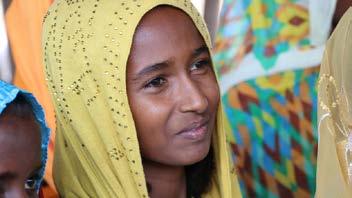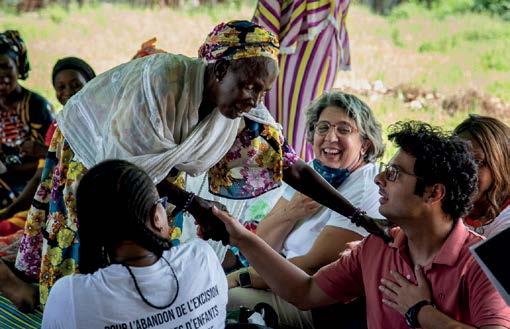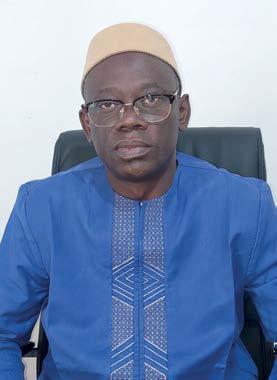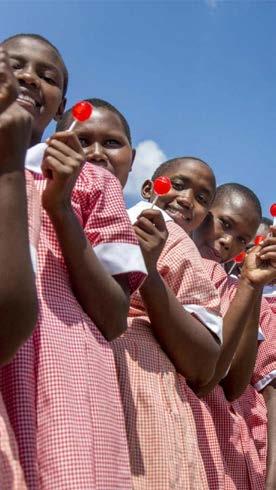
10 minute read
EU’s Leading Support To Eliminate FGM
The ‘Unfinished journey’
WITH FUNDING FRoM PARTNERs, ETHIoPIAN RADIo TAlK sHoWs AIM To END FGM
Advertisement
With the commitment of 10 governments and the European Union, nearly 70 million people have been reached in 17 countries over the past 13 years through the UNFPA-UNIC EF Joint Programme on the Elimination of FGM, the largest global programme to accelerate the elimination of FGM.
In Ethiopia, despite the current conflict and the deteriorating humanitarian situation in several parts of the country, half a million people were reached through the joint programme in 2020, with critical radio and TV programmes on FGM prevention and awareness. UNFPA estimates that 16% of girls below the age of 14 are subjected to FGM in Ethiopia, and 65 percent among girls and women aged 15 to 49. The weekly radio show Yalaleke Guzo is part of the Ethiopian Government’s efforts to lower these rates. Yalaleke Guzo, the “Unfinished Journey”, is a talk show in Amharic language targeting the southern nations, nationalities and Peoples’ Region (sNNPR) of Ethiopia, with a variety of entertainment and education messages on the adverse effects of FGM and child marriage.
Produced in 2020 by the Population Media Center in partnership with the UNFPA/ UNICEF Joint Programme, it is scheduled to run throughout 2022. Its various programmes, including interviews, short stories, health tips, audio plays and others, encourage listeners to change social norms and abandon FGM and other harmful practices.
Recently, shamu Molo, an ex-soldier from the Kibet Woreda, slitie zone, called the radio show to discuss the various inter-generational attitudes towards FGM and child marriage. “I have four daughters,” said shamu. “My wife and I have agreed not to circumcise them. However, my mother, who is the grandmother of our children, wants our daughters to get circumcised because she thinks that uncircumcised girls do not get married.”
To overcome these differences, shamu suggested that efforts to abandon the practice should start at the household level. once awareness-raising initiatives, such as the Yalaleke Guzo talk show, start changing opinions at home, efforts to alter societal attitudes can be by tuning into Yalaleke Guzo and participating in interviews, shamu was able to start conversations with his family, friends and neighbours about the harmful effects of FGM and to advocate for putting an end to it.
“We are proud to see that our support of Yalaleke Guzo is producing such amazing results in the Ethiopian kebeles,” said Mireille Tushiminina, Coordinator of the UNFPA- UNICEF Joint Programme, which is supported by Austria, the European Union, France, Iceland, Italy, luxembourg, Norway, spain, sweden, United states of America and the United Kingdom.
“We believe the radio talk show can play an important role in raising awareness of this harmful practice and in-turn, change people’s entrench perceptions about it, one listener at a time.”
Makeya Wudie, a fifth-grade student from the sNNP region contacted Yalaleke Guzo to help raise awareness of the dangers on FGM in her community. “As soon as i Iearned of my mother’s secret plan [to have me subjected to the practice], I escaped from home and reported the case to the kebele women’s representative”.

inspirational Field Experience in Senegal
A CoNCERTED EFFoRT To END FGM
Steve Jobs once said, “the only way to be truly satisfied is to do what you believe is great work…” My recent 10-day trip to senegal showed me the power of transformation and empowerment. A truly great work of which I certainly want to be part of. My visit to senegal formed a part of my internship with the Joint Programme team of UNFPA and UNICEF on the elimination of FGM. issue in various countries. More than 200 million girls and women today have undergone FGM and as per the estimates, nearly 65 million girls will be cut between 2015 and 2030. The need to take action is imminent and my trip mainly focussed on strengthening efforts to end FGM. It had two main objectives, firstly, to organise the youth roundtable conference for which I was one of the focal points, and secondly, a field trip to provide programmatic support by the Joint Programme on important initiatives to end FGM.
a) Youth roundtable Conference
The first phase of the trip involved the youth roundtable conference. The primary goal of the conference was to bring young leaders from different regions together and chart the way forward for the next phase (Phase IV) of the Joint Programme for ending FGM by 2030. The four days conference held in somone brought people from nearly every country in Africa which included Egypt, south Africa, Djibouti, Guinea, burkina Faso, Kenya, The Gambia and many others. Participants from Yemen also joined the event and a few participants from some other countries such as Indonesia and Colombia. Meeting so many people from such diverse backgrounds and listening to the work they had been doing in their respective countries was an eye-opener. The event brought the experiences of the people to the forefront and ensured that no one is left behind. The discussion in the conference ranged from shifting the unequal power structures to ensuring adequate access to sRHR, directly tying up with the UNFPA’s strategic plan of 2022- 2025. Even outside the conference room, the conversations focused on the struggles and challenges that people especially women and girls face in their society and how they try to overcome them in their daily lives. A young girl from The Gambia narrated the harms of FGM and the struggles of women and girls through powerful poetry. At the crux of it, the conference provided a safe space to discuss critical issues around GbV and harmful practices. It provided a concrete roadmap for the engagement of the youth towards various initiatives which included filling the gap for lack of data, addressing cross border FGM, initiating community-based Alternative Rites of Passage, engaging with security officials/ government for implementation of laws against FGM, and providing equal access to sRHR to the people.
b) Field visits
Post the completion of the conference we began our journey towards the south of senegal to the towns of Kolda and Velingara. A minibus was arranged for the team. The journey from somone to the south of senegal took nearly 10 hours. We crossed through The Gambia, a country that is nestled inside senegal, aunique territorial dynamic,result of a colonial compromise between the erstwhile French and the English.
After arriving late at night in Kolda, the next day we headed to a school where we were apprised about the project ‘New Deal’ that aimed at preventing teenage pregnancies and helped in empowering young girls. They were trained to be selfreliant and taught to produce their own goods. We were welcomed cheerfully and many of the girls shared their stories of personal struggles. one of the girls narrated how she lost her ability to walk after she was cut as a child. Her personal accounts and hardships left many of us emotional. The pain and anger she must be feeling must be immeasurable. The school was helping these girls get back on their feet by providing them access to sRHR and making them self-reliant. An inspiring work that needs to be told far and wide.
The next day we headed to the nearby town of Velingara where we were told about another project, spearheaded by the grandmothers of the town. The project focused on intergenerational dialogue to spread the message against FGM. Teachers, religious leaders, grandmothers, and several others work together to bring an end to the practice. We attended a session where the grandmothers engaged with young children under a tree. Through games and cultural practices, they spread awareness on various issues. We took part in the game and danced alongside as a part of the cultural dialogue. For a moment, we were a part of their community.
c) Concluding thoughts
Watching all these people work in synergy was like seeing a change in the making. It makes me go back to what steve Jobs said about doing great work and loving what we do. The work that UNFPA has been doing is truly transformational, positively impacting the lives of people. I am fortunate to be a part of the process and would certainly continue on this path. There are many memories and experiences that I am taking back from senegal. It was a trip that I will remember for a long time.
Giant Steps to Eradicate FGM in Senegal
A oNE oN oNE INTERVIEW WITH sENEGAlEsE HUMAN RIGHT CoMMITTEE CooRDINAToR
Mr. Abdoulaye MAR is the Coordinator of the senegalese Human Rights Committee, part of the office of the High Commissioner for Human
Rights (UN Human Rights), the leading UN entity on human rights. They represent the world’s commitment to the promotion and protection of the full range of human rights and freedoms set out in the Universal Declaration of Human Rights.
Mr Mar’s interview will share an insight on what senegal is doing on HRC44/16, the Primer and will also share a general opinion on Human Right
Issues.
Based on your political and high-level advocacy and collaboration with member states and the Human Rights Council dimension, what practical suggestions would you share for implementing HRC 44/16, including gender transformative approaches?
FGM constitutes archaic, social and cultural norms with serious consequences on the sexual and reproductive health of girls and women, and as such are considered serious human rights violations that we strongly condemn. We support all initiatives of the state of senegal to eradicate this practice which is still a reality in the country, especially in the North and south. I welcome the adoption of Resolution 44/16 which reminds states of the persistence of the practice of FGM, reminding them of their obligation to respect their commitments to eradicate this practice, while declining its provisions of strategies and axes of intervention whose implementation could help them a lot in the fight. internal appropriation of Resolution 44/16 in a very practical way, by disseminating and popularising the Resolution among the actors and stakeholders. They should equally work with the communities, and in local languages as well as disseminate informations among youth organisations, women’s organisations, grassroots community organisations, women’s groups and health professionals. organise sharing and discussion sessions on the content of the Resolution with the NHRI and civil society on the provisions of the Resolution. This would allow it to re-orientate its mechanism and its strategies on actions against FGM. It will also be very practical to organise sharing and sensitisation sessions for the actors of the judicial system (Magistrates, lawyers, etc).

What are the main steps taken by Senegal regarding the HRC 44/16 and the Primer?
The Resolution is relatively recent as well as the Primer, so my recommendation to the Ministry of the Family, which is in charge of coordinating these actions, is to be conscious of this Resolution, its implications and supporting systems. one of our key steps this year will be to approach them to find the right synergy to promote both the Resolution and the Primer’s agenda.
Despite all the efforts made by Governments, Organisations and groups over the years to help reduce violence against women, the results are not encouraging. What do you think is the reason for this and how can we move forward?
Absolutely, but you have to remember that positively advancing social and cultural norms have never been an easy task. To achieve this, it is necessary to have a synergy of actions, a constant mobilisation and strategies adapted to local realities in order to change mentalities. We need programs that mobilise community actors, women, religious and customary authorities, local leaders, young people in school clubs, and grassroots community organisations, combining education and awareness, information sharing, and good practices. sometimes it is difficult because the populations tend to move. If the repression against this practice is strong in senegal, people can cross the borders to have their children exercised in the sub-region. The fight against this practice must then be concerted, and the states











